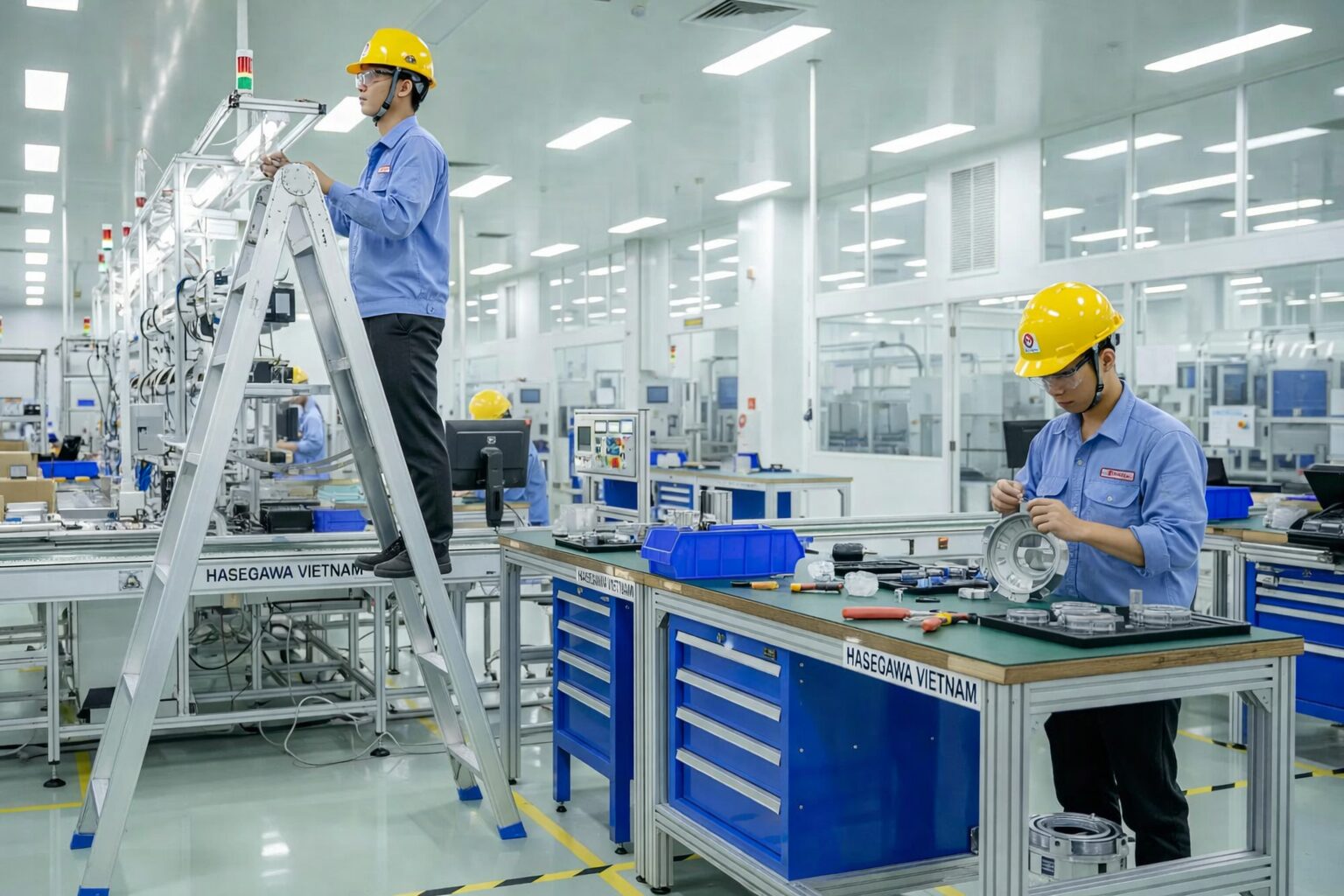Introduction
In recent years, Vietnam’s manufacturing industry has grown to account for approximately a quarter of the country’s total GDP, strengthening its ties with the international market. Within this context, creating products that meet international quality and safety standards is a source of competitive advantage. This article provides a detailed introduction to the initiatives of Hasegawa Vietnam, a company highly regarded both domestically and internationally, particularly in the field of ladders, stepladders, and work platforms.
The target audience includes procurement managers in the manufacturing, construction, and logistics sectors, as well as factory managers and other on-site supervisors who prioritize safety and durability. We will explain, with specific examples and data, how Hasegawa Vietnam meets quality standards and responds to the needs of the workplace.
The Vietnamese Market and the Rise in Safety and Quality Demands
Current State of Vietnam’s Manufacturing Industry
As of 2024, Vietnam’s manufacturing industry accounts for 25.1% of the total GDP, making it one of the leading growth markets in Southeast Asia. However, with approximately 30,000 occupational accidents reported annually, the risk of accidents is high, especially in processes involving work at heights or heavy machinery. In response to this situation, the international market increasingly demands compliance with standards such as ISO and JIS, which clearly guarantee product strength, durability, and safety design.
The Importance of Occupational Safety and Health
The main causes of occupational accidents in Vietnam are aging equipment, inadequate adherence to work procedures, and a lack of safety devices. In contrast, international standards (such as ISO 9001 and JIS S 1121) mandate the establishment of a quality assurance system that covers everything from material selection and manufacturing processes to pre-shipment inspections. Adhering to these standards can reduce the incidence of accidents at work sites and enhance product reliability.
The Strengths of Hasegawa Vietnam
Manufacturing System Compliant with International Standards
Hasegawa Vietnam has established a manufacturing system that meets the strict quality standards required for products exported to Japan and the United States. By using high-strength aluminum alloys such as A6005-T5 as primary materials, the company achieves both durability and light weight through precise extrusion processing and high-precision assembly processes. Furthermore, weather-resistant labels (equivalent to 1000 hours in a QUV test) that can withstand outdoor use and anti-slip designs to prevent falls are standard features.
Local Expansion Leveraging Experience from China Business
By transferring the manufacturing and sales know-how cultivated in its China business since 2001 to its Vietnam base, the company has smoothly adapted to the local market. Notably, it has succeeded in developing suppliers to source a portion of the aluminum materials, previously imported from China, domestically within Vietnam. Additionally, starting from the cleanroom market, where demand is high in the precision equipment and medical fields, the company is pursuing a strategy of horizontal expansion into other industries such as airport maintenance and medical facilities.
Production Expansion and Customization Capabilities
Hasegawa Vietnam, which plans to triple its production volume over the next five years, is also renowned for its ability to handle custom orders in addition to mass production. For example, the company provides custom-made products tailored to specific site environments while meeting safety standards, such as large work platforms for aircraft maintenance at airports and specialized stepladders for inspecting railway vehicles. Through close collaboration with customers, Hasegawa Vietnam designs and manufactures products that combine functionality, safety, and durability.
Expanding Sales Channels Through Exhibitions
Case Study: Cleanfact RHVAC Exhibition
In November 2024, Hasegawa Vietnam exhibited for the first time in Vietnam at the “Cleanfact RHVAC” trade show. The objectives were twofold: to develop new B2B markets and to discover local aluminum material suppliers. This exhibition, specializing in the cleanroom sector, was highly compatible with the company’s precise and high-quality product characteristics, making it suitable for a direct approach to potential customer segments. Utilizing local support for booth setup and companion staffing, the company actively engaged with visitors. As a result, they collected business cards and surveys from over 200 visitors, achieving their KPI for the exhibition.
Next Step: VIMF 2025
Building on this success, Hasegawa Vietnam has decided to participate in “VIMF 2025,” to be held in June 2025. This exhibition, taking place in Binh Duong, known as an industrial hub, targets the manufacturing industry as a whole and is ideal for creating contact points with the factories and related companies that Hasegawa targets. Moving forward, the company plans to not only expand its sales channels through connections made at exhibitions but also to further strengthen its presence in the Vietnamese domestic market through technical cooperation and joint development with local partner companies.
Data Box
| Indicator | Value | Year | Source |
| Vietnam Manufacturing GDP Ratio | 25.1% | 2024 | General Statistics Office of Vietnam |
| Annual Occupational Accidents | 30,500 cases | 2023 | Ministry of Labour, Invalids and Social Affairs (MOLISA) |
| Hasegawa Vietnam Capital | 3.8 million USD | 2025 | Corporate Information (NC Network) |
| Number of Employees | 60 | 2025 | Corporate Information (NC Network) |
| Production Expansion Plan | Triple in 5 years | 2025 | Corporate Information (NC Network) |
Conclusion
Hasegawa Vietnam’s competitiveness is supported by three pillars: “quality standards compliant with international norms,” “thorough on-site safety,” and “flexible international expansion capabilities.” These are not merely about product performance but are also directly linked to building long-term customer trust and enhancing brand value in the market.
Future challenges will include expanding production capacity, strengthening collaboration with local suppliers, and developing products for new market entry. On the other hand, the growing demand for safety and quality both within and outside Vietnam presents a favorable opportunity for Hasegawa Vietnam to demonstrate its strengths.
For product catalog requests or specification inquiries, please feel free to contact Hasegawa Vietnam via their official website or sales representatives.

